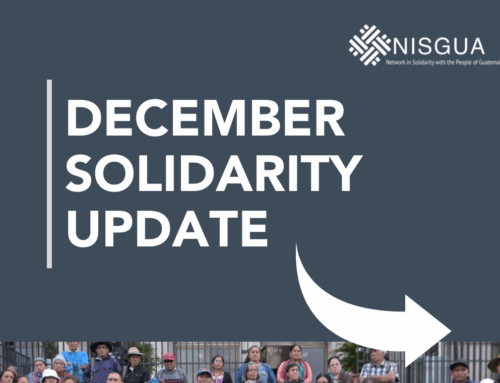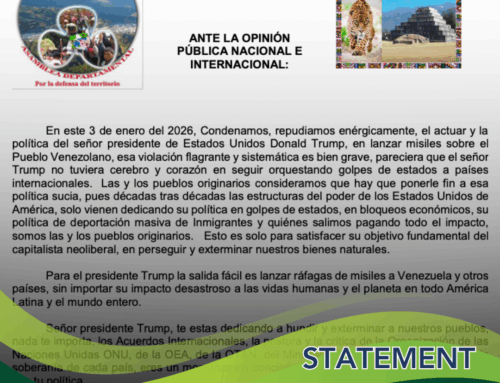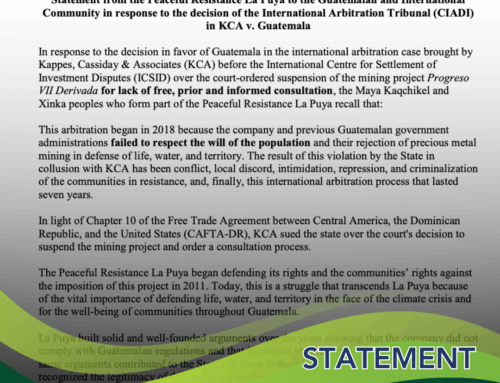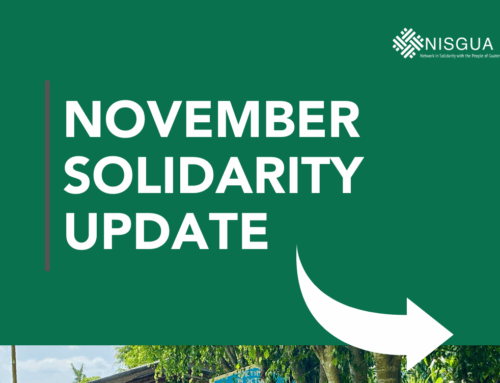Since the fire at a Guatemalan state-run youth shelter on March 8, International Women’s Day, 41 teenage girls have died. According to news sources, the girls were locked in a room after having escaped the previous night amidst protests denouncing conditions at the facility, which include allegations of extensive sexual violence and abuse by facility staff. The girls were not let out, even after a mattress was set on fire in the room and the blaze quickly spread.
Since the fire, several Guatemalan organizations have released statements putting the fire into an historical context of state repression and violence against women. Across the U.S., Guatemalan communities have held vigils in honor of the victims and protests calling on Guatemalan Consulates in the U.S. to do their part to ensure justice. We stand with the families of those who lost their lives, with those fighting for accountability and repair, and with all who struggle to root out the structures of patriarchal violence and end abuse against women and girls. Visit our website for a more detailed account of the fire, the aftermath, and demands from civil society.
|
|
Justice & Accountability
- The women of Sepur Zarco celebrate one year since the verdict and continue to call for dignified reparations
- Public Prosecutor’s office appeals to INTERPOL after Guatemala Congressman Edgar Ovalle goes missing
- U.S. Secretary of Homeland Security John Kelly visits Guatemala
Defense of Life & Territory
- La Puya celebrates five years of resistance
- Communities respond to Goldcorp’s announcement that the Marlin Mine will cease operations come May
News from the Grassroots
- UC Berkeley students take action in solidarity with victims of the fire at a state-run home for youth
- One year after the murder of Berta Cáceres
- Follow our spring delegation online
- NISGUA is hiring: Communications & Development Coordinator
|
|
|
Women survivors of Sepur Zarco meet in the House of Memory to discuss the verdict and the state of reparations one year later.
Photo: NISGUA
|
|
|
The women of Sepur Zarco celebrate one year since the verdict and continue to call for dignified reparations
On February 26, 2017, women survivors of Sepur Zarco and their allies celebrated the first anniversary of the verdict that convicted two former Guatemalan military officials for crimes against humanity in the form of sexual violence and sexual and domestic slavery.
Activities held in Sepur Zarco culminated in the inauguration of a mobile health clinic – the first and only reparations measure ordered in the verdict to be partly addressed by the Guatemalan government. While the women survivors and their allies hold up the verdict itself as an important milestone for gender justice, they point to the need for comprehensive reparations to not only address the material and collective trauma experienced during the internal armed conflict, but also to transform the very systems that perpetuate violence against women.
To commemorate the anniversary, NISGUA published a report on the ongoing fight for comprehensive reparations. Download the report here.
|
|
Public Prosecutor’s office appeals to INTERPOL after Guatemala Congressman Edgar Ovalle goes missing
On March 15, Congressman Edgar Ovalle's diplomatic immunity was revoked by Guatemala's Supreme Court, opening the door for him to be prosecuted for his alleged role in committing crimes against humanity during the internal armed conflict. Ovalle was an operations official in the Ixil region, at a time when genocide was being carried out against the Ixil population; later, he acted as an intelligence officer in Military Zone 21 in Alta Verapaz. Over the past few years, hundreds of bodies have been exhumed from the site as part of investigations into the largest known case of forced disappearance in Latin America’s history. A warrant was issued for Ovalle’s arrest after his diplomatic protection was withdrawn, but his whereabouts remain unknown. On March 19, Guatemala’s Attorney General Thelma Aldana appealed to INTERPOL for assistance in locating Ovalle.
|
|
U.S. Secretary of Homeland Security John Kelly visits Guatemala
In late February, John Kelly made his first state visits to Guatemala and Mexico as U.S. Secretary of Homeland Security. Prior to his cabinet appointment, Kelly was Commander of U.S. Southern Command from 2012-2016, overseeing all U.S. military operations in Central and South America, as well as the Caribbean.
In a moment in which the Trump administration faced intense international criticism for its chaotic roll-out of xenophobic immigration policies, Kelly reassured Guatemalan President Jimmy Morales that there would be "no massive deportations" under his leadership, insisting that only undocumented immigrants with criminal records would be prioritized for deportation. Directives ordered by Trump and signed by Kelly the same week contradicted this claim, however, as the new administration moved to broaden the scope of immigrants targeted by ICE and allow for deportees to be sent to Mexico regardless of their nation of origin. During his visit, Kelly clarified his stance as he witnessed the arrival of a plane filled with Guatemalans recently deported from the U.S. and issued a public warning to Guatemalans considering migrating north: "You'll be returned very quickly."
Despite Kelly's efforts at softening the image of Trump's approach to immigration, the new administration has aggressively targeted immigrant and refugee communities, intensifying Obama-era policies of detention and deportation, while deepening interventionist economic policies that create the conditions of migration and put human rights at risk in the region.
|
|
In 2012, during the third month of the resistance encampment 'La Puya', Marleni Morales, from San Pedro Ayampuc, stands in front of a banner that reads: “Every Mine Contaminates.”
Photo: James Rodríguez. Click for more photos.
|
|
|
DEFENSE OF LIFE & TERRITORY
|
|
La Puya celebrates five years of resistance
For five years, the peaceful resistance ‘La Puya’ has fought against the construction and operation of the El Tambor mine in their municipalities of San Pedro Ayumpuc and San José del Golfo, on the outskirts of Guatemala City.
In a big win for the community, the Ministry of Energy and Mines finally complied last year with court orders to suspend mining activities due to a lack of a valid construction license. Nevertheless, Daniel Kappes, President and CEO of Kappes, Cassiday and Associates (KCA) - the company that owns the license to the mine - responded to the decision with a full-page ad in Guatemala’s national newspaper claiming that radical, socialist, terrorist, and anarchist-minded NGOs had instigated local resistance to the mine for their own financial gain. He stated that the company would not comply with orders to remove the machinery.
KCA's Guatemalan subsidiary, EXMINGUA, has yet to vacate the premises, leaving communities concerned that the company will not respect the decision made by Guatemala’s highest court. Continuing into their fifth year of resistance, communities have stated that they will not leave the encampment until all of the machinery is gone.
|
|
Communities respond to Goldcorp’s announcement that the Marlin Mine will cease operations come May
Canadian mining giant Goldcorp Inc. announced that it will be closing down the Marlin Mine in the western highlands of Guatemala this coming May, 12 years after gold and silver extraction began. Since 2005, neighboring communities have consistently expressed their opposition to mining activities in their territories. And now, they remain concerned that the mine closure may lead to further contamination of the local water supply, as the disposal of toxic chemicals such as cyanide could cause serious environmental harm. Given Goldcorp’s notorious track record of environmental and human rights abuses, there is little trust that the company will close the mine responsibly.
At a press conference on March 6, ancestral authorities from the municipalities closest to the mine – San Miguel Ixtahuacán and Sipakapa – asked the Public Prosecutor’s office to partner with the UN-backed International Commission Against Impunity in Guatemala (CICIG) to investigate acts of alleged corruption between Goldcorp and local governments and state institutions, which communities argue resulted in the granting of the exploitation license for the Marlin mine in the first place.
The Miguelense Defense Front, FREDEMI released a statement denouncing the negative impacts the company has caused since arriving to the region. "More than 10 water springs have disappeared due to the open pit and underground mining operations. More than 500 family homes have cracked as a result of the mine. Many children suffer skin diseases from bathing in stream waters surrounding the mine that are contaminated with aluminum, cadmium, arsenic, lead, sulfates, and nitrates. For the full statement in Spanish, click here.
|
|
|
Students at UC Berkeley light candles around the Guatemalan flag, in memory of the girls killed at a state-run home.
Photo: UC Berkeley, Brittany Hosea-Small
|
|
|
UC Berkeley students take action in solidarity with victims of the fire at a state-run home for youth
On March 13, students at UC Berkeley held a vigil to honor the 41 girls killed in the deadly fire that took place at a youth shelter outside of Guatemala City on International Women's Day, which many are calling the largest massacre since the signing of the Peace Accords. Dozens attended the campus vigil organized by Central American students, some of whom are founders and members of the student group Central Americans for Empowerment (CAFÉ). The vigil was one of many that took place across the U.S. in the wake of the fire.
During the vigil, two organizers read a letter they wrote calling upon the Consulate General of Guatemala in San Francisco to pressure the Guatemalan government to seek justice for the girls and their families. In the letter, the students place the fire in the context of centuries of violence against women and patterns of impunity for sexual violence and femicide. "In the name of all the victims, of all the girls who lost their childhood and opportunity to live, we demand the social, political, and economic liberation of all women in Guatemala."
Later that week, organizers presented the letter to the General Consul, vowing to continue raising awareness and demanding accountability on behalf of the victims. "Given Guatemala's history of corruption and impunity, we want the Guatemalan government to know that people are watching internationally and will not rest until there is justice for the girls." The organizers hope to send messages of solidarity directly to the families of the victims. Read their letter to the Consulate General in English and Spanish.
|
|
One year after the murder of Lenca activist Berta Cáceres
March 2 marked one year since environmental defender Berta Cáceres was murdered in her home in La Esperanza, Honduras. Winner of the 2015 Goldman Environmental Prize, Cáceres was a leader of the Civil Council of Popular and Indigenous Organizations of Honduras (COPINH), known for their work defending land and rivers in Lenca indigenous territory from transnational hydroelectric projects and mining concessions.
One year after her murder, a full and independent investigation has yet to take place. Eight people suspected to be the material authors of her murder have been arrested, including current and former members of the Honduran military and former workers of the Agua Zarca hydroelectric project – the same project that Berta actively opposed. Last month, the Guardian published an investigation that suggests that the murder may have been an extrajudicial killing, planned by people with links to U.S.-trained special forces. Two of the men arrested, the chief of military intelligence at the time of her murder and a retired military officer, have both received military training in the U.S. The U.S. continues to provide major support to the Honduran military and police despite reports of grave human rights violations.
NISGUA joined over 30 other national and international solidarity organizations in the call for an independent investigation to take place under the auspice of the Inter-American Commission on Human Rights.
TAKE ACTION: COPINH, along with other Honduran indigenous and community leaders, continue to face danger for their work in defense their land and rivers. Call on your member of Congress to support the Berta Cáceres Human Rights Act in Honduras, which would suspend U.S. military and security aid to Honduras pending full and credible investigations into the assassinations of Berta and other human rights defenders.
|
|

|
This April, join us virtually during our "Women and the Work of Liberation" delegation to Guatemala
Unable to join us in Guatemala for our spring delegation? Follow us online as we meet with partner organizations to explore women's leadership in movements for social justice and liberation in Guatemala! Follow us daily on Twitter and visit our blog for regular updates.
Contribute to our scholarship fund! NISGUA delegations offer a unique opportunity for horizontal exchange with Guatemalan communities at the forefront of global struggles for self-determination, social justice, and respect for the Earth. By making a gift to our scholarship fund, you help make our delegations accessible to participants from communities similarly impacted by global systems of oppression and likewise engaged in struggles for social justice and human rights, in particular indigenous, multiracial/POC, poor/working class, and queer people. |
|
We're hiring: Communications & Development Coordinator
We are seeking an energetic and committed person to join our Guatemala City team as the Communications and Development Coordinator. The coordinator will be responsible for using communications strategies to advance NISGUA's mission, strengthen its network, and expand its grassroots fundraising initiatives. Together with other program staff, they will be responsible for bottom-lining the creation and distribution of information and analysis on the current situation in Guatemala through written and web-based materials, including urgent actions and campaigns, news updates and press releases, and in-depth reports.
The Communications and Development Coordinator will join a 35+ year legacy of international solidarity, playing a key role in amplifying the voices of Guatemalan activists leading the fight for community self-determination, social justice, accountability, and respect for the Earth. Visit our website for a full job listing. Application deadline: May 1, 2017.
|
|
|
|











Leave A Comment